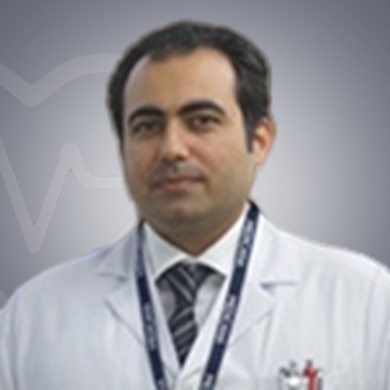
17 Years of experience
Speaks: English
Dr Abdullah Kursat Cingu is a renowned ophthalmologist who has vast experience in various surgeries and can treat a number of conditions listed below:
Some of the most common eye conditions that the ophthalmologist treats are Diabetic Retinopathy, Dry eye Syndrome, and Conjunctivitis. The doctor might prescribe some antibiotics for bacterial conjunctivitis. Antibiotics might help lessen the length of infection. For dry eyes, the doctor will do physical examinations, and treatment may include use of artificial tears and reduce tear drainage.
You must see an opthalmologist if you have any of the below-listed symptoms:
The above signs and symptoms suggest that you need to see an eye specialist. Having serious eye problems on time can help you restore your vision. Sometimes, non-vision eye problems may be treated to keep the eyes comfortable and the eyesight sharp. It is important to go for routine eye examinations to diagnose the condition.
You can consult Dr Abdullah Kursat Cingu from 10 am to 5 pm. The ophthalmologist works an average of 47 hours per week.
Some of the popular procedures performed by Dr Abdullah Kursat Cingu are listed below:
LASIK (Laser in Situ Keratomileusis) uses a laser to reshape the cornea. This procedure uses a certain laser designed to treat vision issues, improve vision, and also reduce the need for glasses and contact lenses. The laser alters the shape of your cornea.

Share Your Experience about Dr. Abdullah Kursat Cingu

Ophthalmologists are doctors who handle the medical aspects of eye care, such as treatment, surgery, and prescription of glasses and contact lenses as well as medicines for different eye problems. Some ophthalmologists work with other eye care team, coordinate with optometrists as well as other medical professionals to provide care for chronic eye conditions. If you have an eye problem such as cataracts or any other conditions that would require surgical treatment, an ophthalmologist is a suitable doctor to address your problem. Though an ophthalmologist generally treats eye-related problems, they may also offer consultation for conditions that are not linked to the eyes. They also take part in scientific research to find new treatment methods.
For the evaluation of your eye condition, you have to get certain tests done which may include the following:
An opthalmologist may perform a number of different tests to evaluate your vision and diseases. Each test will evaluate some specific aspect of vision. The doctor may direct a beam of light in your eyes to look for any abnormalities in the retina. They design the treatment plan posts after evaluating the test reports.
Some of the signs you need to visit an ophthalmologist include:
The above signs and symptoms should not be ignored and must be discussed with an eye specialist because the diagnosis of eye condition at an early stage will help the doctor to plan effective treatment, They may also discuss your symptoms with other doctors to determine the right treatment.